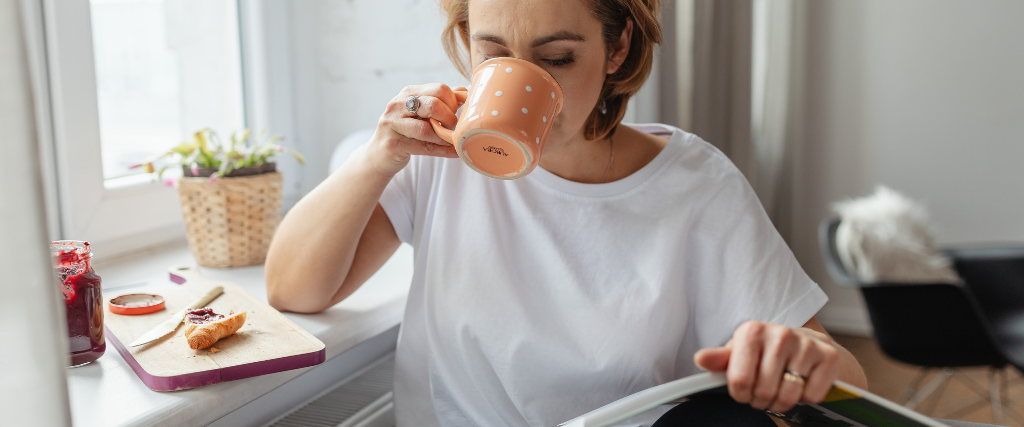Steph’s Top Tips for Working From Home

Here are my tips:-
1. Lower your expectations of yourself and communicate this with your colleagues
Take this tip with a grain of salt. Not all jobs allow you to just say to colleagues – “hey, I am going to take my foot off the gas for a while, ok?” However, what you can do, is be clear with your manager about what is realistic for you to achieve when extraordinary circumstances occur, whether that be a lockdown or a different personal event. It might be that your leader agrees and understands that this is a temporary situation and allow things to go with the flow, or it might require more planning so that some work can be moved around the team or be deprioritised. They might also just workshop this with you, resulting in you feeling less overwhelmed and acknowledging you can work to the same capacity.
2. Something’s gotta give, but be selective and purposeful about what
Well, naturally, I wasn’t doing any one thing super well. Work was getting interrupted by my kids and parenting involved throwing snacks and putting on the tv more than I would like to. Like everyone, I had no routine so wasn’t exercising at all and got out of bed at varying times each day. I would also be tempted to eat lunch at 10:30 because I had a lull in meetings and was sitting next to my fridge. So, I wasn’t eating nutritiously, I wasn’t exercising, I wasn’t seeing my loved ones, work was suffering, and I wasn’t nailing parenting. AND THAT IS OK. However, once I realised that this was having such a negative impact on my wellbeing, I took a good look at what I was willing to compromise on and what were my non negotiables. I realised that I was ok with snacking all day long, but I needed more firm boundaries in my work hours and in my exercise habits – but I couldn’t commit to much. So, I simply instated two 6am hour long walks each week (sometimes I did more, but this was my minimum) and I started to get better at turning my laptop off at the end of the workday and be present for dinner/ bath/ bedtime. I still gave myself permission to slide out of bed and straight to the laptop, because I intentionally chose this approach to get my deep work done. It isn’t ideal to be working at 5am in normal life, but during the Sydney lockdown, I needed this time for deep work – I needed that flexibility.
Identify one or two things that are non negotiable and be gentle on yourself when the other things slip – that’s a solid approach to any period of stress.
3. Strive for short bursts of uninterrupted focus
Whilst this might not be the perfect set up for deep work, given the environment I was working in, I quickly realised my time for deep creative work would have to be the early morning (much more optimal for me than evening and before my children are awake) so the rest of the day I could break my day up into segments where I could focus and attempt to minimise interruptions. Setting a timer of 25 minutes on my phone with a loud alarm and then moving my phone away from me. Knowing that I only had to focus for 25 minutes meant I didn’t resist it, having the phone out of reach helped me resist picking it up to check the time/ the news/ case numbers/ weather/ socials. If I planned for 25 mins on and 15 mins off, then my kids were often satisfied with that attention from me, and it gave me time to praise their artwork or make them (more) snacks. Of course, each day I would also have to take an hour here or there to take them to the park (again) and their dad did the same thing so we could focus for longer without any distraction at all. And look, it isn’t the best set up and hopefully not something I will ever have to do again, but the planned, short bursts of concentration is a technique I take going into work in 2022 understanding how easily distracted my mind can be when under higher levels of stress.
4. Challenge the mindset around productivity = output
Historically, as a result of industrialisation, our society associates productivity with more = better. More content, higher engagement, greater revenue = success. Well, of course there are elements of this and times when this is absolutely the case, but also there are many, many roles and times where slowing down, absorbing information, reading, listening, taking a break, networking, reviewing or other less measurable activities are paramount to the success of a person/ role/ task. I spent the first half of 2021 really digging deep to challenge that old school corporate mentality that has been drilled into me that unless I had firm tangible outputs at the end of a day – “see, I wrote four articles, planned three events, cleaned the oven, took the kids to wonderland, did my taxes. Wasn’t I successful today!” then the day was a failure. In my current job, it is essential that I stay across the latest research and trends in workplace health and wellbeing, so I am required to read a lot and connect with people and listen. I have had to work hard at allowing myself to have days and weeks where rather than producing output, I am instead adding to my knowledge and growing as an expert. As well as this I have accepted that rest is an essential element of productivity. Working more hours does not mean you are more productive. Taking a day off to rest or do self care often equates to future days being more productive.
5. Treat yourself!
During a stressful time, showing up for work is HARD. It was gruellingly hard at times. Having things to look forward to has always been my way of remaining motivated and inspired but during a lockdown this was increasingly difficult. Whilst I am lucky enough to really like my job, the work I do and the people I work with, I, like most was exhausted beyond belief. So, to keep the little moments of joy I gave myself moments to look forward to. My walk to the coffee shop every morning, a donut at 3pm on Fridays, a phone call with my best friend, work zoom drinks once a fortnight. Journaling on a Saturday morning before the kids woke up. Sprinkling my week with things that I can look forward to, are realistic, and bring me joy was the key to keeping things going.
Now, these five tips are not official health advice! They are just the things that I did, to keep my wellbeing at a level that allowed me to continue working and be ok. I did not thrive. But I did it, and the family and my work is all in one piece.
